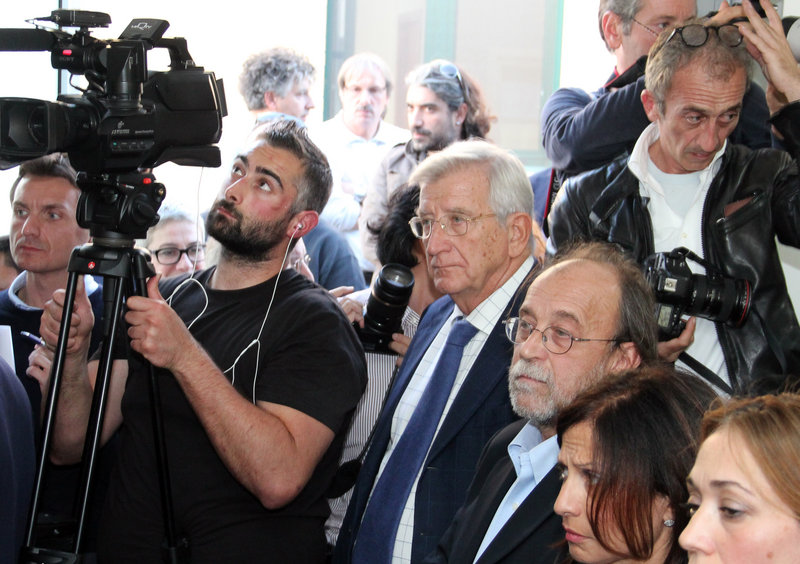L’AQUILA, Italy – In a verdict that shocked the scientific community, an Italian court convicted seven experts of manslaughter Monday for failing to adequately warn residents of the risk before an earthquake struck central Italy in 2009, killing more than 300 people.
The defendants, all prominent scientists or geological and disaster experts, were sentenced to six years in prison.
Earthquake experts worldwide decried the trial as ridiculous, contending there was no way of knowing that a flurry of tremors would lead to a deadly quake.
“It’s a sad day for science,” said seismologist Susan Hough of the U.S. Geological Survey in Pasadena, Calif. “It’s unsettling.”
That fellow seismic experts in Italy were singled out in the case “hits you in the gut,” she said.
In Italy, convictions aren’t definitive until after at least one appeal, so it was unlikely any of the defendants would face jail immediately.
Italian officials and experts have been prosecuted for quake-triggered damage in the past, including a 2002 school collapse in southern Italy that killed 27 children and a teacher. But that case centered on allegations of shoddy construction in quake-prone areas.
Among those convicted Monday were some of Italy’s best-known and most internationally respected seismologists and geological experts, including Enzo Boschi, former head of the National Institute of Geophysics and Volcanology.
“I am dejected, desperate,” Boschi said. “I thought I would have been acquitted. I still don’t understand what I was convicted of.”
The trial began in September 2011 in this Apennine town, whose devastated historic center is still largely deserted.
The defendants were accused of giving “inexact, incomplete and contradictory information” about whether small tremors felt by L’Aquila residents in the weeks and months before the April 6, 2009, quake should have been grounds for a warning.
The 6.3-magnitude temblor killed 308 people in and around the medieval town and forced survivors to live in tent camps for months.
Many much smaller tremors had rattled the area in the previous months, causing frightened people to wonder if they should evacuate.
“I consider myself innocent before God and men,” said another convicted defendant, Bernardo De Bernardinis, a former official of the national Civil Protection Agency.
Prosecutors had sought convictions and four-year sentences during the trial. They argued that the L’Aquila disaster was tantamount to “monumental negligence,” and cited the devastation wrought in 2005 when levees failed to protect New Orleans during Hurricane Katrina.
Relatives of some who perished in the 2009 quake said justice had been done. Ilaria Carosi, sister of one of the victims, told Italian state TV that public officials must be held responsible “for taking their job lightly.”
The world’s largest multidisciplinary science society, the American Association for the Advancement of Science, condemned the charges, verdict and sentencing as a complete misunderstanding about the science behind earthquake probabilities.
There are swarms of seismic activity regularly in Italy and most do not end up causing dangerous earthquakes, said geologist Brooks Hanson, deputy editor of the organization’s Science magazine. He said that if seismologists had to warn of a quake with every series of tremors, there would be too many false alarms and panic.
“With earthquakes we just don’t know,” Hanson said Monday. “We just don’t know how a swarm will proceed.”
Comments on Twitter about the verdict abounded, with references to Galileo, the Italian scientist who was tried as a heretic in 1633 for his contention that the Earth revolved around the sun and not vice versa, as Roman Catholic Church teaching then held. In 1992, Pope John Paul II declared that the church had erred in its ruling against the astronomer.
Still, some experts argued that the trial was about communicating risk and not about whether scientists can or cannot predict earthquakes.
Copy the Story LinkSend questions/comments to the editors.



Success. Please wait for the page to reload. If the page does not reload within 5 seconds, please refresh the page.
Enter your email and password to access comments.
Hi, to comment on stories you must . This profile is in addition to your subscription and website login.
Already have a commenting profile? .
Invalid username/password.
Please check your email to confirm and complete your registration.
Only subscribers are eligible to post comments. Please subscribe or login first for digital access. Here’s why.
Use the form below to reset your password. When you've submitted your account email, we will send an email with a reset code.